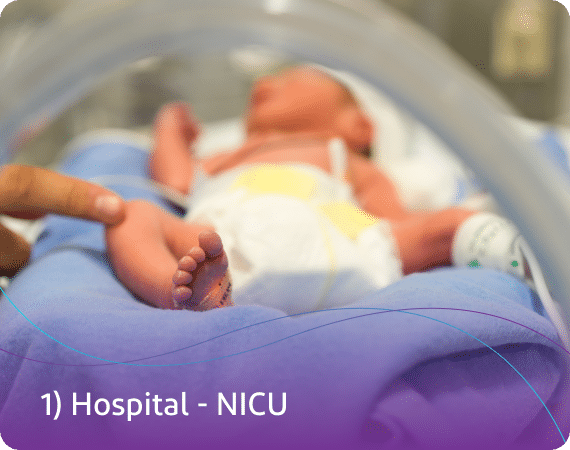Request A
Demo
We enable healthcare organizations to get started with precision medicine anywhere they want – oncology? pediatrics? cardiology? pharmacogenomics?

This simple sports analogy underscores a critical consideration for precision medicine success: if genomic information isn’t available – to all providers across the entire organization – they can’t use it to advance care for patients. Locking the information in specialty- or practice-specific systems dilutes the value of genomic results. Pharmacogenomic and germline data remains the same throughout the patient’s lifetime. If the information is stored and managed so it can be accessed across the continuum, its worth is compounded (and costs can be spread broadly and over time). That’s what 2bPrecise delivers.


Emma is born and suffers severe seizures.
Genomics test (germline and pharmacogenomics/PGx) is performed, uncovering the specific genetic disease causing the disorder. The clinician is able to arrive at the correct diagnosis earlier and prescribes the appropriate medication to control Emma’s seizures. She is discharged to home.
Without genomic testing, it would be more difficult and time consuming for the physician to arrive at a diagnosis. This could result in lengthy hospitalization, readmission to the hospital, multiple office visits. This way the doctor got to the seventh medication (the right one) first, saving months of problems.

Emma is now in elementary school and is suspected to have ADHD.
Physician refers to the genomics test performed at birth to verify suspicions and decides to prescribe Adderall, which Emma metabolizes normally (discovered through the PGx test at birth). Emma responds and behavior returns to normal.
Uncertainty about what is contributing to Emma’s behaviors and what medication will be most effective with fewest side effects.

Emma’s genomics tests had revealed she was a higher risk for breast cancer. Her physician instituted early screening protocol and was able to detect the disease sooner, when Emma was 42.
Disease is diagnosed early and somatic tests (tumor profile) are ordered. Following lumpectomy and using information about the mutation of the tumor (instead of relying only on the site of the cancer), physician prescribes Tamoxifen to achieve better results and avoid drug-drug interactions with other medications Emma takes.
Emma responds well to prescribed chemotherapy and recovers quickly. No additional treatment (e.g., radiation) is required and cancer is in remission.

At 69, Emma is being treated for multiple conditions including high blood pressure, high cholesterol, GERD and depression. Her conditions are well controlled, and she leads a full and active life.
Genomics testing not only revealed variants that helped Emma’s internist diagnose her conditions in a timely manner, it allowed the doctor to prescribe medications that she would respond to and from which she would suffer fewer side effects. In addition, the doctor was able to evaluate possible drug-gene interactions, which meant no adverse reactions between the medications.
Emma has not been hospitalized or in the ED since her breast surgery decades earlier. PGx testing has helped her ensure her conditions are controlled and adverse drug reactions don’t cause problems like dizziness or falls, which could land her in the hospital or skilled nursing facility.

The 2bPrecise platform allows you to get started with precision medicine in the area that makes most sense for your organization – maternal/fetal medicine, oncology, behavioral health, cardiology, pediatrics and so on. Then you can scale incrementally to bring various service lines on board. Plus, our deep expertise in ontologies, data models and clinical integration future-proofs your investment in 2bPrecise. We ensure your organization can fully leverage new scientific discoveries and therapeutic applications – without having to retool your technology infrastructure or precision medicine strategy.
We enable healthcare organizations to get started with precision medicine anywhere they want – oncology? pediatrics? cardiology? pharmacogenomics?
